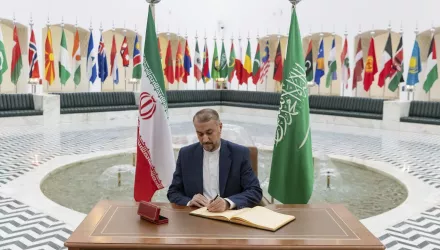For Americans watching the deepening economic crisis in Russia, the most important question is why it matters to us. Given modest levels of U.S. investment and trade and muffled impacts on American markets, Russia's crisis would be important, but no more so than earlier crises in Korea and Indonesia.
But Russia is not Indonesia. The reason why Russia's meltdown matters for Americans is much more specific and potentially catastrophic. As an economic crisis accelerates the disintegration of authority in Russia, history has left a superpower arsenal.
Start with 7,000 nuclear warheads: armed, mounted on missiles, capable of arriving at targets in the United States less than an hour after a decision to launch. Add 5,000 tactical nuclear weapons, many without any locking devices to prevent their use. Recognize that many of these are at bases where a colonel with the cooperation of two lieutenants could privatize a dozen warheads, take them to world markets and monetize their value. Add 12,000 nuclear weapons in various storage facilities of Russia, protected by guards whose salaries have been delayed for months.
Consider approximately 70,000 nuclear weapons equivalents in stockpiles of highly enriched uranium and plutonium. One unit to Osama bin Laden's terrorists would provide the critical ingredient for a crude nuclear device. Compound this with biological weapons materials, chemical weapons and thousands of ICBMs and know-how for producing more missiles without limit.
In sum, the overriding reason Russia's economic meltdown matters for Americans is that it magnifies the threat of "loose nukes": the theft of one or a dozen weapons, sale to a rogue state or terrorist group and the use of these weapons to threaten or attack Americans at home and abroad.
Because such a threat has no precedent in the Cold War, U.S. policymakers have put it in the "too hard" box. How important is this threat relative to others? Take North Korea, where the U.S. brokered a $ 4 billion inducement to freeze a nuclear program that would have produced enough plutonium for six weapons per year. Ask why the United States and Israeli governments have given top priority in security discussions with Russia to stopping Russian companies from providing marginal assistance to Iranian efforts to develop its own missile program. Now, imagine a Russian government so enfeebled or corrupt that a defense enterprise, or criminals within it, could sell Iran operational missiles.
This threat has been recognized by the U.S. government; through the Nunn-Lugar program, the United States has devoted about $ 400 million annually to it. That is one-sixth of one percent of our defense budget. In effect, our posture amounts to waiting for a nuclear wake-up call before we get real.
What then is to be done? When President Clinton goes to Moscow, he should recognize that however desirable free markets and democracy, the path from totalitarianism is long and arduous. Much has been accomplished, principally in destroying the prison Communism built for 70 years. But the strategy for jumping from a Soviet economy to free markets proved too ambitious. It was unable to withstand a 50 percent fall in oil prices and turbulence from Asia on top of the Yeltsin government's incompetence.
What should the president focus on? What matters most to U.S. interests: securing control of nuclear and other weapons of mass destruction. Specifically, concentrate weapons and materials at the fewest possible sites; construct control systems at these sites including electronic monitors; provide steady pay for facilities guards; deploy international guards on a second perimeter outside the fenced area protecting Russian facilities. These steps should come first in U.S. policy.
Before democratization, before marketization, before any other objective, we need do everything we can to secure loose nukes now -- before Russia's economic meltdown becomes America's nuclear nightmare.
The writer, director of Harvard's Belfer Center for Science and International Affairs, was assistant secretary of defense in 1993-94.
Allison, Graham. “Why Russia's Meltdown Matters.” The Washington Post, August 31, 1998




